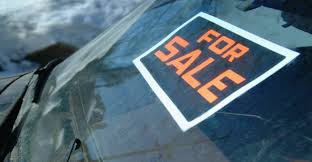We have all heard the horror stories – like how Mrs Murphy up the road got some dodgy phone call, gave someone her bank details and ended up losing her life savings. Or how someone’s cousin actually clicked on one of those dodgy email links and had their credit card cloned and used to buy a villa an Acapulco.
Scams are nothing new. The scammers may now be using email and links rather than fraudulent letter of introduction or calling cards, but the idea of the confidence trick goes right back to the birth of human kind. Once we had things we valued, those with looser scruples were always looking for ways to get those things away from us.
And so it is with cars. The sad fact is that while the vast, vast majority of those selling you a car or buying one from you are totally above board and honest, there is still the one per cent out there who aren’t and it’s from them that you need to protect yourself - the car scams.
A current car scam
 What has become particularly prevalent of late is the use of emigration, or a phone overseas location to try and crowbar some money out of you.
What has become particularly prevalent of late is the use of emigration, or a phone overseas location to try and crowbar some money out of you.
Ireland has long been a nation of emigrants, and this form of scamming doubtless has been designed to tug at the heart-strings of some poor person who’s had to leave the country and either needs to sell their car in a hurry or wants to buy something quick because they’re coming home. Few families or households in the country don’t know a brother, sister or cousin who’ve had to leave for overseas, so as a way of getting your defenses down, it’s a pretty good starting point.
How it works – buying a car
 These scams, broadly, work in two ways. When you’re buying a car, you need to be careful if you’re looking at a car that seems younger than is average for a given price, or has a sharply discounted price compared to other similar models. Never forget that what looks too good to be true almost certainly is…
These scams, broadly, work in two ways. When you’re buying a car, you need to be careful if you’re looking at a car that seems younger than is average for a given price, or has a sharply discounted price compared to other similar models. Never forget that what looks too good to be true almost certainly is…
The advert will most likely have been cloned from another, legitimate advert but with the price and seller details suitably changed. What you need to watch for is how the seller asks you to contact them, and if it’s by email only, be very skeptical. Always use the phone for an initial contact, and preferably only if the call goes to a landline.
Once in contact, the dodgy seller will do everything they can to wheedle a deposit out of you, or even the whole cost of the car, and will use the ‘I’m out of the country’ excuse at every turn. The whole idea is to get you to pay part or all of the price of the car, sight unseen, but of course there’s no car. No seller. And no comebacks.
How it works – selling a car
 When things are going the other way around, the trick is even simpler. If you’ve put a car for sale online, be very wary of any contact (again, especially by email) purporting to be from overseas and in need of a quick purchase, or through some kind of third party. It’s even gotten to the subtle point where the dodgy buyer can actually deposit the full amount of the car’s price in your account, and even collect the car, but then kick off some kind of phony dispute over the condition of the car or claiming that they never took possession of the goods. They then reclaim the deposit, via their bank and are never heard from again.
When things are going the other way around, the trick is even simpler. If you’ve put a car for sale online, be very wary of any contact (again, especially by email) purporting to be from overseas and in need of a quick purchase, or through some kind of third party. It’s even gotten to the subtle point where the dodgy buyer can actually deposit the full amount of the car’s price in your account, and even collect the car, but then kick off some kind of phony dispute over the condition of the car or claiming that they never took possession of the goods. They then reclaim the deposit, via their bank and are never heard from again.
Or, they deposit the cash, but send too much ‘by accident’ and then ask you to return the overpayment. Once you’ve added their bank details to your online banking setup, it’s all too easy for them to then use that connection to get into your account and take what they want. Again, the “I’m living overseas” thing is often used as an excuse for inconsistencies.
What recourse is there?
So, what can you do? Well, you don’t have to become outright paranoid but you can take a few simple steps. First off, never be satisfied with just email contact. Always insist on talking over the phone and if you’re meeting face to face make sure it’s at a legitimate business or home address, and not a random pub car park.
Of course, carrying out a history check can give you a lot of pointers as to any potential scams. While a history check can’t tell you if a seller is genuine or not, knowing a car’s background details will help you to pick up on any inconsistencies in their story.
And never, ever send by electronic bank transfer or PayPal any amount of money to someone you simply don’t know. Always check and check again their details and perhaps contact the bank they’ve given you the details for to check their references.
And please, don’t have nightmares…